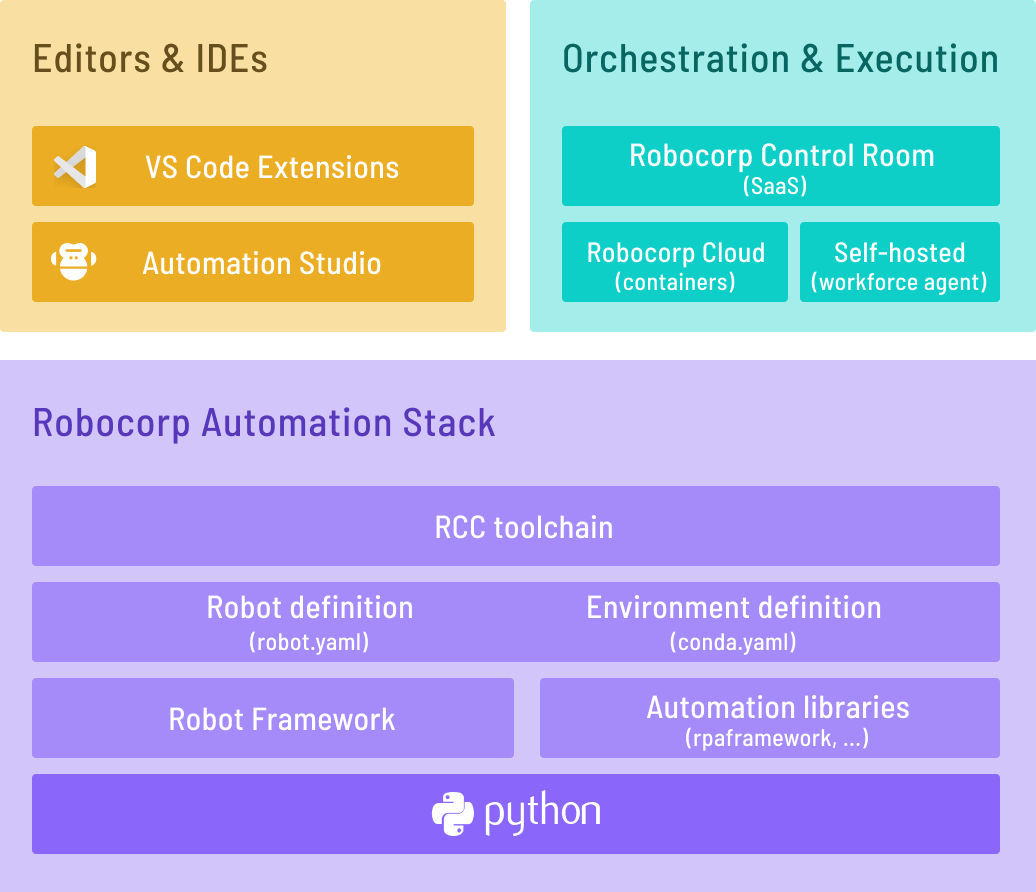RCC is a set of tooling that allows you to create, manage, and distribute Python-based self-contained automation packages - or robots 🤖 as we call them. And run them on soft-containers that have access to rest of your machine.
Together with robot.yaml configuration file, rcc is a foundation that allows anyone to build and share automation with ease.
RCC is actively maintained by Robocorp.
- Are developers manually installing conda or pip packages? Here rcc makes it easier for developers to just worry about getting
conda.yamlandrobot.yamlright, and then let rcc to do the heavy lifting of keeping environments pristine, clean, and up to date. - Have you run into "works on my machine" problem, where the original developer has a working setup, but others have a hard time repeating the experience? In this case, let rcc help you to set up repeatable runtime environments across users and operating systems.
- Have you experienced "configuration drift", where once working runtime environment dependencies get updated and break your production system? Here rcc can help by either making drift visible or freezing all dependencies so that drifting does not happen.
- Do you have python programs that have conflicting dependencies? There rcc can help by making dedicated runtime environments for different setups, where different
robot.yamlfiles define what to run andconda.yamldefines runtime environment dependencies
⏬ Install rcc
![]() Pull robot from GitHub:
Pull robot from GitHub:
rcc pull github.com/robocorp/example-google-image-search
🏃 Run robot
rcc run
🐣 Create your own robot from template
rcc robot initialize -t standard
For detailed instructions, visit Robocorp RCC documentation to get started. To build rcc from this repository see the Setup Guide
- Open the command prompt
- Download:
curl -o rcc.exe https://downloads.robocorp.com/rcc/releases/latest/windows64/rcc.exe - Add to system path: Open Start ->
Edit the system environment variables - Test:
rcc
- Install:
brew install robocorp/tools/rcc - Test:
rcc
Upgrading: brew upgrade rcc
- Open the terminal
- Download:
curl -o rcc https://downloads.robocorp.com/rcc/releases/latest/macos64/rcc - Make the downloaded file executable:
chmod a+x rcc - Add to path:
sudo mv rcc /usr/local/bin/ - Test:
rcc
- Open the terminal
- Download:
curl -o rcc https://downloads.robocorp.com/rcc/releases/latest/linux64/rcc - Make the downloaded file executable:
chmod a+x rcc - Add to path:
sudo mv rcc /usr/local/bin/ - Test:
rcc
Follow above link to download site. Both tested and bleeding edge versions are available from same location.
EULA for pre-built distribution.
Visit https://robocorp.com/docs to view the full documentation on the full Robocorp stack.
Changelog can be seen here. It is also visible inside rcc using command rcc docs changelog.
Some tips, tricks, and recipes can be found here. They are also visible inside rcc using command rcc docs recipes.
The Robocorp community can be found on Developer Slack, where you can ask questions, voice ideas, and share your projects.
You can also use the Robocorp Forum
Apache 2.0

